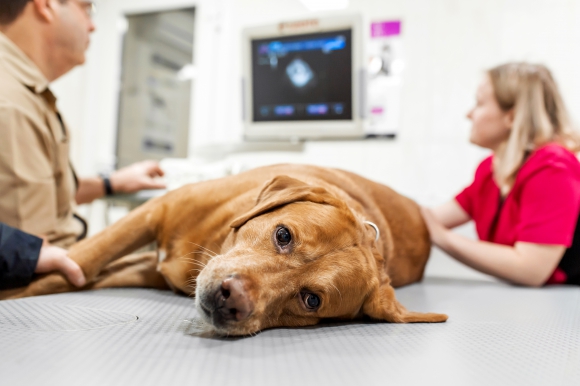


ASK US
Companion Animal Heart Disease
Heart disease is common in our companion animals, affecting around 15-20% of all dogs and cats, and can arise for many reasons. Heart disease research has provided many therapeutic options for managing the condition, from medications and therapeutic foods to advanced surgical options such as pacemakers. Ongoing research has also been looking at better ways to detects risks and early stage disease. Interestingly, recent studies have shown that the risk of heart disease is on the rise due to grain free and exotic ingredient diets. As further research emerges, the nutritional management of patients will also see some shifts in recommendations.
At Packerland Veterinary Center, we like to approach heart disease on several levels to address the overall health of the pet. ECG will allow us to look at the rhythm of heart, and for possible electrical issues. Special blood testing, like IDEXX’s ProBNP, can help differentiate primary heart disease from primary lung disease on the more difficult cases. With echocardiogram we can visualized the heart structures in real time to better assess overall function and contractility. A proper diagnosis can make the treatment of heart disease more effective, thus increasing the pet’s prognosis by providing a customized treatment plan for the individual. Valve abnormalities, heart dilation, heart thickening, congenital disease, heart tumors, pulmonic and aortic stenosis are all very different reasons for the heart to fail, and echocardiogram is helpful in diagnosing and managing these conditions. Once we have diagnosed the type of heart disease and start the appropriate medication, we can further help the heart with prescription diets. Care for the majority of patients follows the ACVIM guidelines for heart disease diagnosis and treatment. Patients are staged, based on their disease and their care plan is then created and adjusted to meet their needs. Patients that have been diagnosed with congenital heart defects, such as PDA and PRAA, typically require surgical attention which we also offer at Packerland. 
Heart patients require close monitoring, with 2-3 routine progress exams recommended yearly as long as the pet is doing well. The management of a heart patient also relies quite heavily on the owners, who are tasked with the monitoring of clinical signs on a daily basis. Client education and developing a good veterinary-client relationship with the owners can make patient management easier and more successful. Heart disease can change and worsen quickly, therefore close monitoring of clinical signs, combined with yearly comparative radiographs, and echocardiogram evaluations as need, often provide a good measure of control. Routine lab work monitoring based on their medication regimen is also implemented.
If you have any questions or concerns, please do not hesitate to contact us.



